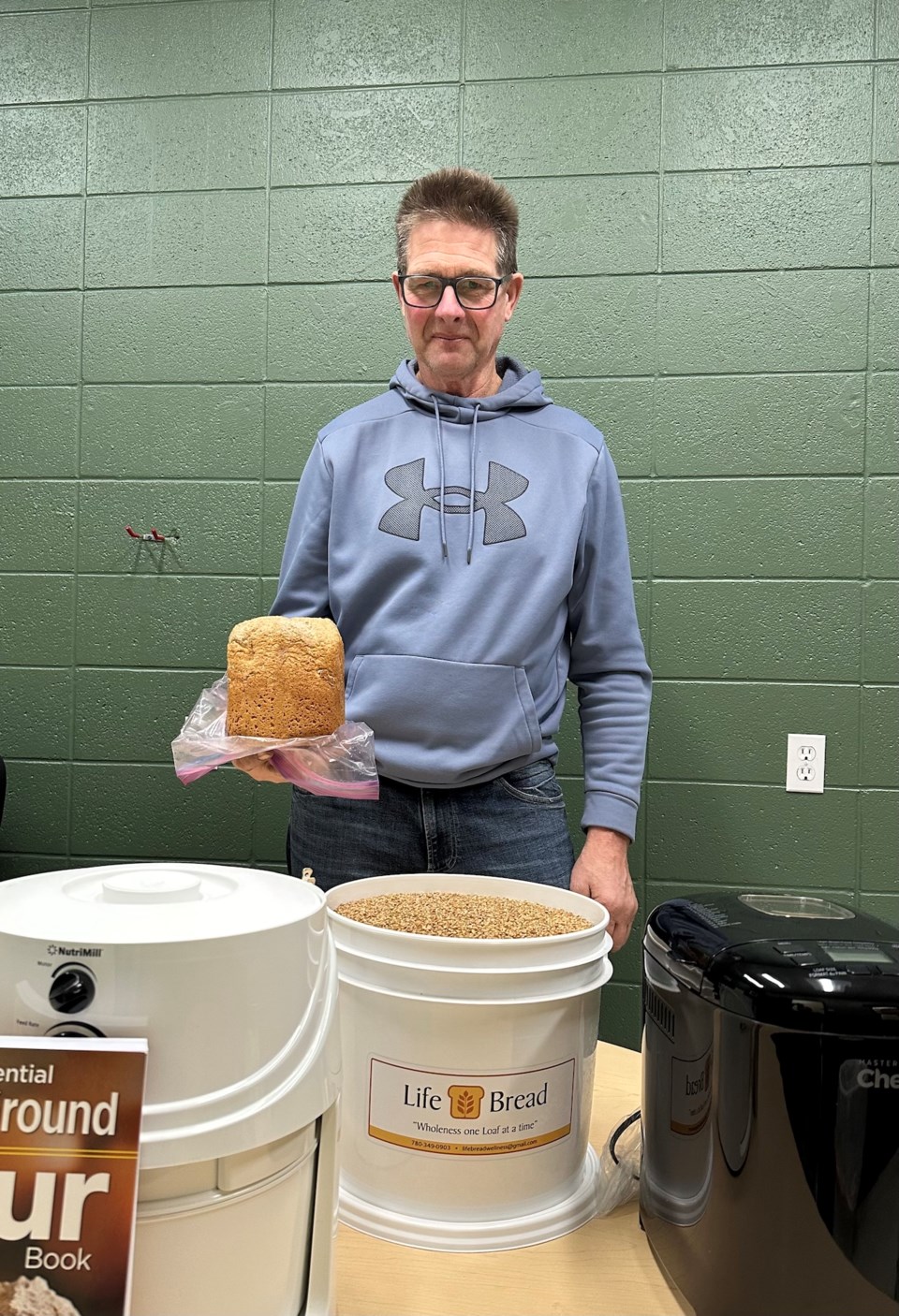ATHABASCA — As Albertans prepare to see rising costs for U.S. goods on grocery store shelves, shoppers are looking for ways to identify Canadian-made goods to keep their dollars in-country.
But before talk of tariffs and trade war started making daily headlines, a group of researchers and innovators in Athabasca began conversations around how to create and strengthen local food economies under the title Athabasca Grown.
And one local farmer is making the ideals of buying from one’s backyard and keeping cash within the community his bread and butter with a new business: selling whole wheat berries and equipment to make freshly ground flour.
“My daughter’s actually been doing it for a couple years,” said Otto Rottier, originator of Life Bread Wellness. “She’s been home baking and selling some baking goods and selling some flour.
“I realized how easy it was and then started reading up on how good it is for you, and I said ‘I have to make this available to the public and not just keep it to ourselves,’” he added. “I’ve grown wheat for probably thirty years but never actually tried to eat it myself.”
Previously from Westlock, Rottier and his wife now live and produce grain in the Athabasca area. After trying his hand at a few loaves in late fall — and learning lessons along the way — Rottier was ready to hit the ground running, and started selling pails of wheat berries, or unprocessed hard red wheat and grain grinders as an alternative to store bought flour.
“The narrative out there is that wheat is bad, and there’s a whole lot of people with gluten intolerant issues and it does appear to be from the wheat, but if you look at it further, it’s not actually the wheat, it’s what’s done to the flour.”
White flour originates from wheat berries, but during the grinding process much of the wheat bran and germ, which contain large amounts of vitamins, minerals and fibre, are removed. A portion of the bran and germ are added afterwards to reconstitute the flour, but studies have shown reduced nutritional value of refined flour compared to whole grain flour.
Whole wheat grains carry 40 of 44 essential nutrients for life, including vitamins A, B, and E, iron, magnesium, and zinc. Sue Becker, one proponent of fresh, whole grain flour since 1992, points to the commercialization of flour milling in the early 1900’s as the source of nutrient loss in flour, and subsequently breads and baked goods of many varieties.
Rottier said although diagnosed celiacs — an autoimmune disorder in which wheat triggers antibodies — likely won’t be able to eat fresh, whole grain flour, some individuals with gluten sensitivities have seen success by making the switch, and the benefits don’t stop there.
“Number one, the taste is tremendous. The taste is unbelievable compared to what you buy in the store,” said Rottier. He said after switching to homemade bread from his own flour, his sugar cravings and hunger pains throughout the day have been non-existant, not to mention the convience.
“If you ask a mom with four kids if she’s got time to bake bread, well she’ll say there’s no way. But if I could should her that it’s possible with very minimal effort and she had a very nutrious product, she’ll say yes,” said Rottier. “Everybody can put five minutes into their routine to throw some ingredients into the breadmaker, that’s what it takes.”
Since starting the venture in Mid-November, Rottier said Life Bread Wellness has a customer base of 60 locals taking advantage of the niche offerings. Rottier sells 20-pound buckets of berries, along with electric wheat grinders and a recipe book complete with creations far beyond bread.
To complete the package, customers can also purchase a bread maker from Rottier. In all, the starter package with grinder, bread maker, and enough wheat to make 16 loaves costs around $500.
“For most people, you just have to look at it as an investment,” said Rottier. “You go to the grocery store and for most families, $500 is not (a lot). This will probably save you that in two or three months.”
He said customers have teamed up to purchase mills and wheat together to reduce the upfront cost, have looked into grinder attachments for other kitchen appliances, or committed to baking the old fashioned way — with plenty of elbow grease.
And in addition to the nutritional benefits, Rottier said working towards greater food security for himself and his community are a major pro to his new business venture.
“Why would you not want to get your food locally? There’s a lot of things going on in the world, and this might even become a necessity,” he said.
After a little more than three months in business, Rottier is hopeful Life Bread Wellness will continue its rise in popularity in the community. A new website for the business is in the works, and as Rottier works on sourcing more mills for his customer base, he’s optimistic more and more people will want to discover the goodness of whole grains.
“I’d like to see it go mainstream, I’m not sure how that looks yet but I can see having somebody set up in different towns,” said Rottier. “I don’t think there’s a limit, actually.”
Those interested in learning more about Life Bread Wellness can contact Rottier at [email protected].



